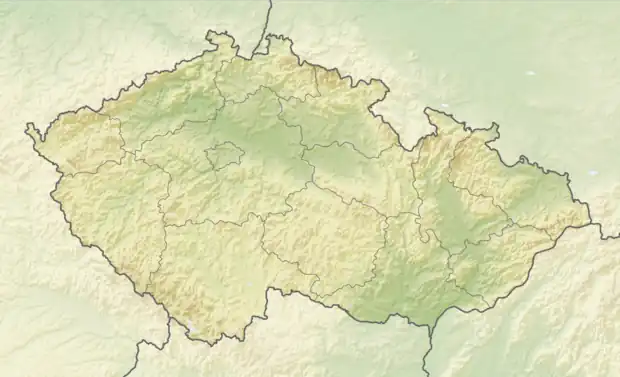Pavlov | |
|---|---|
%252C_Karlovarsk%C3%A1_ul._01.JPG.webp) Karlovarská street | |
 Flag  Coat of arms | |
 Pavlov Location in the Czech Republic | |
| Coordinates: 50°5′47″N 14°10′2″E / 50.09639°N 14.16722°E | |
| Country | |
| Region | Central Bohemian |
| District | Kladno |
| First mentioned | 1519 |
| Area | |
| • Total | 1.56 km2 (0.60 sq mi) |
| Elevation | 387 m (1,270 ft) |
| Population (2023-01-01)[1] | |
| • Total | 209 |
| • Density | 130/km2 (350/sq mi) |
| Time zone | UTC+1 (CET) |
| • Summer (DST) | UTC+2 (CEST) |
| Postal code | 273 51 |
| Website | www |
Pavlov (Czech pronunciation: [ˈpavlof]; German: Paulow) is a municipality and village in Kladno District in the Central Bohemian Region of the Czech Republic. It has about 200 inhabitants.
Geography
Pavlov is located about 5 kilometres (3 mi) southeast of Kladno and 11 km (7 mi) west of Prague. It lies in a flat agricultural landscape of the Prague Plateau.
History
The first written mention of Pavlov is from 1519, when there was a farm owned by the Saint Vitus Chapter in Hostouň. In 1726, the then-owner Ferdinand Kustod of Zubří and Lipka administratively connected 10 houses and a brewery from the surrounding settlements to the farm and created the Nový Dvůr manor.[2]
After the manor changed hands several times, it was bought by Leopold Paul in 1799. He had built a manor house and a settlement next to the farm, and named it after himself Pavlov (Paulow in German).[2]
Transport
The D6 motorway from Prague to Karlovy Vary passes through the northern part of the municipality. Pavlov is also served by a railway station on the railway line from Prague to Kladno.
Sights
Pavlov is poor in monuments. The only protected cultural monument is a small castle from the early 19th century.[3]
References
- ↑ "Population of Municipalities – 1 January 2023". Czech Statistical Office. 2023-05-23.
- 1 2 "Historie" (in Czech). Obec Pavlov. Retrieved 2022-05-19.
- ↑ "Výsledky vyhledávání: Kulturní památky, obec Pavlov". Ústřední seznam kulturních památek (in Czech). National Heritage Institute. Retrieved 2023-07-13.